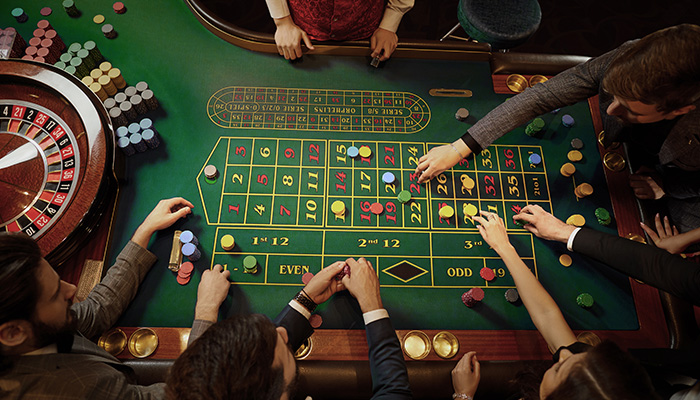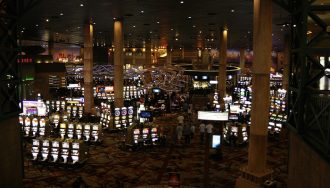Casino Conspiracy Theories Evaluated
 Casino Conspiracy Theories
Casino Conspiracy Theories
- Casino Windows: What Other Conspiracies Turned Out To Be True?
- Casino Design: The Most Well-Known Conspiracy
- Roulette Rigging: A Shocking Revelation
- Jackpots: Are They Truly Random?
- Slot Machines: Rigged Against Players?
- Dealers WANT Players to Lose
- Frequently Asked Questions
Casinos are ripe with myths, legends, and conspiracy theories. Gamblers have always wondered if the house really has an edge or if the games are secretly rigged against them. In this blog, we will explore some of the most well-known casino conspiracies.
Thankfully, in 2023, both land-based casinos and online casinos are heavily regulated. Casino tech is more advanced, and it’s almost impossible for reputable operators to cheat.
Casino Windows: What Other Conspiracies Turned Out To Be True?
Many casino conspiracy theories are nothing more than fun speculation. However, some theories, such as the lack of casino windows, have turned out to be true over the years. Backroom card marking, rigged machines, and programmer cheats are just some other casino crimes that came to light after beginning as rumors.
However, these have, almost always, been one-off cases. As a result, today, we’re not going to focus on these – choosing, instead, to look at more well-known conspiracies. While some of these conspiracies have been said to be involved at online casinos, this blog focuses, primarily, on land-based casinos.
Casino Design: The Most Well-Known Conspiracy
Casino design is a fascinating subject that goes far beyond aesthetics. It’s a well-crafted science aimed at enhancing the gaming experience while subtly encouraging players to stay longer and spend more. The most well-known “conspiracy” in casino design is the intentional lack of windows and clocks. This design choice is not accidental; it’s a strategic move to create an environment where time seems irrelevant.
The absence of casino windows ensures that natural light doesn’t interfere with the artificial ambiance created inside the casino. Without the natural progression of daylight, players lose track of time, allowing them to immerse themselves in the games without the nagging reminder that hours are passing by. The same goes for the lack of clocks on the walls. Without a constant reminder of the time, players are less likely to cut their gaming sessions short.
But the design “conspiracies” don’t stop there. The layout of a casino is often maze-like, with winding paths that lead players past a variety of games and attractions. This design encourages exploration and makes it more challenging for players to find the exit. The longer they wander, the more likely they are to stop and try a new game.
The choice of casino colors, lighting, and even scents are all part of the casino’s design strategy. Warm colors like red and yellow are often used to evoke excitement and energy. The lighting is carefully controlled to create a flattering and inviting environment. Some casinos even pump specific scents into the air to create a pleasant and memorable experience.
However, the reason why we put quotation marks around the word “conspiracy” in this section, is that none of this is actually secret knowledge. There are design firms that specialize in casino layout – so while it’s an interesting example of a “casino conspiracy”, it is also completely true.
Roulette Rigging: A Shocking Revelation
Roulette is a game that has captured the imagination of gamblers for centuries. Its simplicity and unpredictability are part of its charm. However, the idea that roulette can be rigged has been a conspiracy that some players have refused to let go.
Rigging a roulette wheel is not an easy task, but it has been done. In some cases, magnets have been used to influence the ball’s movement, allowing it to land in specific pockets. In other instances, biased wheels have been discovered where certain numbers come up more frequently due to manufacturing imperfections.
However, in today’s land-based casinos, any game that’s offered to players is subject to stringent checks. What’s more, these checks are random. In Nevada, for example, representatives from the Gaming Control Board have the legal right to enter any gambling premises and check the machines 24 hours a day, seven days a week. So far, no roulette wheels have been found to be rigged – although, as demonstrated, it’s certainly possible.
In the world of online gambling where regulation is less “physical”, games are regularly audited by independent organizations. Players can look for certifications and licenses to ensure that they are playing at a reputable venue. Some of the major online gambling regulators are shown below:
| Regulator Name | Location |
|---|---|
| United Kingdom Gambling Commission (UKGC) | The United Kingdom |
| Malta Gaming Authority (MGA) | Malta |
| eGaming Curacao | Curacao (Netherlands Antilles) |
| Danish Gambling Commission | Denmark |
Jackpots: Are They Truly Random?
Progressive jackpot games – whether in the form of a video slot or a casino table game – are often the most commonly played games in a casino. For example, head to virtually any of the online casinos in the US, and you’ll see several progressive jackpot games – some offering gigantic amounts of money reaching into the millions.
The conspiracy theories surrounding jackpots often center on the idea that they are controlled or rigged to pay out at specific times or to specific players. These theories are fueled by the seemingly unpredictable nature of jackpots and the incredible sums of money involved.
In reality, legitimate casinos use Random Number Generators (RNGs) to determine the outcome of jackpot games. These RNGs are complex algorithms that produce random and unpredictable results. They are regularly tested and certified by independent organizations to ensure their fairness and integrity.
Some players believe that casinos can manipulate jackpots to pay out more frequently during slow periods or to withhold payouts during busy times. However, this would be both illegal and incredibly difficult to achieve. Modern jackpot games are designed to be transparent and fair, with the outcomes determined solely by chance.
In every licensed gambling jurisdiction, progressive jackpot machines are actually subject to even more regulation than other games! This means regulators and casino tech experts get to look inside the source code – and they’d immediately see if there was anything illegal going on.
Slot Machines: Rigged Against Players?
The slot machine conspiracy that previous gameplay determines future payouts is a widespread belief that many gamblers actually believe – but usually, only after enduring a losing session! This conspiracy suggests that slot machines are programmed to recognize patterns in player behavior and adjust the payouts accordingly. The theory often manifests in various forms, such as the belief that a machine that hasn’t paid out in a while is “due” for a big win, or that a machine that has just paid out a jackpot is unlikely to do so again soon.
At the heart of this conspiracy is the idea that slot machines have a memory of previous plays and can somehow know when they are supposed to pay out. This belief leads some players to engage in behaviors like “machine hopping,” where they move from one machine to another, trying to find the one that is ready to pay out.
However, the reality of modern slot machines is quite different. As we just saw in the progressive jackpots section, all slot machines use what’s known as a random number generator. This random number generator determines the outcome of every spin – ensuring that it is indeed 100% random. In other words: each spin is independent of the previous one, and the outcome of one spin has no bearing on the next.
The belief that previous gameplay determines future payouts is a misunderstanding of how slot machines work. It’s a psychological phenomenon known as the “gambler’s fallacy”, where players believe that past events can influence future outcomes in random processes.
Casinos and game manufacturers are well aware of this conspiracy and often go to great lengths to ensure transparency and fairness in their games. Slot machines are regularly tested and certified by independent organizations, and the algorithms used are subject to rigorous scrutiny.
Dealers Want Players to Lose
One somewhat amusing casino conspiracy claims that dealers actively try to make players lose in order to benefit the house. This conspiracy comes from the notion that dealers will provide poor service, mispay wins, or even cheat to force player losses. While fantasies of corrupt dealers lining their pockets drive this conspiracy theory, the reality is quite the opposite.
In truth, dealers have every incentive to want players to win. Unlike house employees in other industries, dealers in casinos often depend on tips as a major portion of their income. When players win, they tip more generously. When they lose, tips decline.
Dealers also have little ability to directly influence game outcomes at reputable casinos. Strict supervision and game protocols limit opportunities for cheating. In some games, it’s not even the main dealer that handles the chips – craps being a good example, where up to three staff members work at once.
While individual rogue dealers have been caught cheating over the years, this has been extremely rare. Large-scale collusion would be virtually impossible today thanks to advanced surveillance technology and rigorous oversight governing casino dealers.
Furthermore, dealers have no special insight into impending game results. Outcomes like where the roulette ball lands are random – known to no one. Even if they wanted to, dealers have no capability to “choose” who wins or loses.




